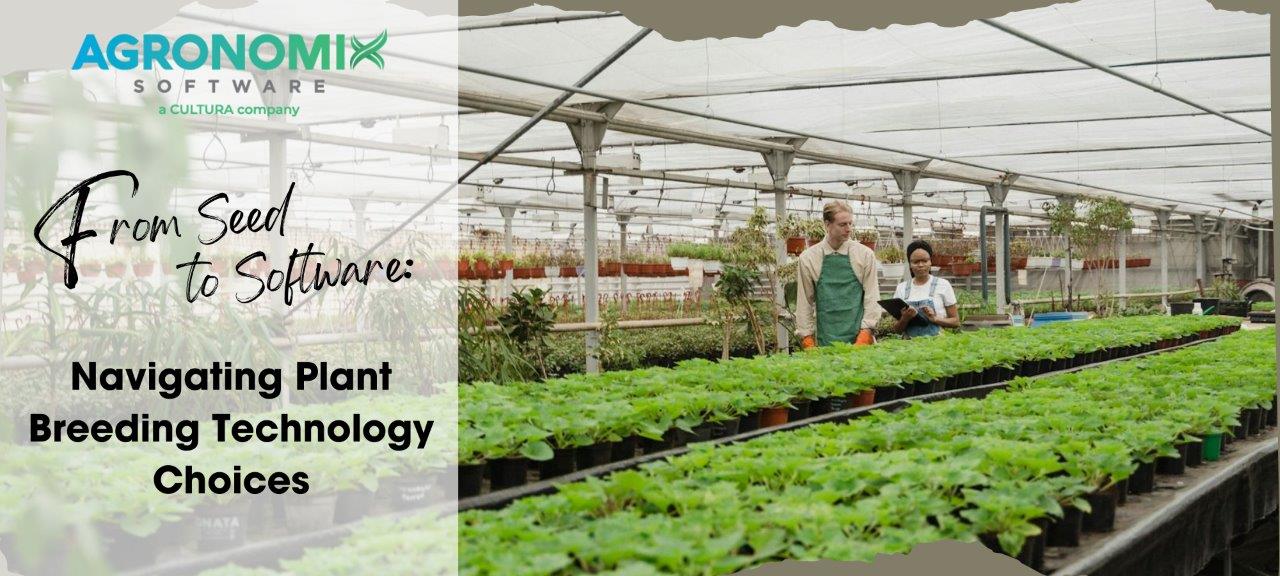Plant Breeding: A Game Changer for Future Industry Challenges
The agricultural industry is facing ongoing challenges, whether as a result of rising populations and increased food demand, or as a result of climate change, which poses existential threats to agriculture as we know it. For years, the industry has been concerned about how to meet rising food demand. All while adhering to increasingly stringent climate regulations that limit production expansion. For over 30 years, Agronomix has recognised the importance of plant breeding to the world’s population and its role in addressing many of the agricultural industry’s future challenges. In this blog, we take a look at a study conducted by HFFA Research where they consider the socioeconomic and environmental value of plant breeding in the EU. The findings of this study provide an insight in the valuable role that plant breeding has to play in the future of food production worldwide.
Feeding the World Through Plant Breeding
The world population has quadrupled over the last century and is soon expected to surpass 8 billion. By 2050, the world must produce around 60% more food to feed an estimated 9.3 billion people. unfortunately, current food production is struggling to keep up. A report in 2020 revealed that 690 million people are hungry, a statistic up by nearly 60 million in just five years. While technological advancements have transformed how efficiently and productively we can produce food products, we must do all we can to ensure the industry can keep up with ever growing demand moving forward.
The study conducted by HFFA Research clearly demonstrated the effectiveness of plant breeding in increasing food product production. Plant breeding contributed 67% to innovation-induce yield growth across all significant arable crops grown in the EU. In fact, plant breeding advancements over the last 20 years resulted in an increase in cereal and oilseed production of 53 million tonnes and 8 million tonnes, respectively. This remarkable increase in output increased global food supply for 168 million people!
The world is not yet able to meet the fast-increasing demand of the growing population. What is clear is that plant breeding will play a critical role in ensuring food security for communities all over the world.
Saving the Climate and Preserving Natural Habitats
The environmental challenges posed by agriculture are huge and the implications on agriculture itself even bigger. It is estimated that the global agricultural and food production industries account for up to 29% of GHG emissions. Higher temperatures and changes in weather patterns caused by climate change reduce crop yield and increase the likelihood of short-term crop failures and long-term production declines. With 2 billion more mouths to feed by 2050, the world cannot afford these outcomes.
Aside from increasing crop production, plant breeding can aid in the reduction of land and water use, both of which have a direct impact on global biodiversity and the industry’s GHG emissions. According to HFFA Research, without plant breeding over the last 20 years, the area used for agriculture worldwide in 2020 would have had to increase by more than 21.5 million hectares.
Furthermore, by 2020, genetic crop advancements in the major arable crops had prevented nearly 4 billion tonnes of direct CO2 emissions. This also goes beyond emissions. Water is a resource becoming increasingly scarce due to longer periods of hot weather. However, in the EU, plant breeding allowed for a more effective use of it. HFFA Research found that the world today would require almost 50 billion m3 more of water if plant breeding didn’t exist. This is equivalent to the volume of Lago di Garda!
With global trading partners, the EU’s reduced land use and lower CO2 emissions, will have a positive impact on GHG emissions and biodiversity loss in other parts of the world. It is a sign of the global effectiveness of plant breeding and the path on which agriculture may have to rely in order to secure increased alongside improved sustainability.
The Role of Plant Breeding in the Future
The global food crisis debate has become polarised, pitting conventional agriculture and global commerce against local food systems and organic farms. Both approaches provide necessary solutions, but neither alone will get us to where we need to go.
What we do know at Agronomix, is that plant breeding can transform the future of food. It’s what we’ve been helping researchers and breeders to do for the last 30 years. If we maintained the current rate of plant breeding, we could cut production and subsequent market supply losses in half. Genovix®, our latest software, was created with the needs of the industry in mind. Developed with our extensive experience and knowledge of plant breeding software, it enables users to achieve plant breeding and variety testing goals with greater confidence, efficiency, and profitability. Genovix® equips plant breeders with the tools they need to face the challenges that lie ahead with confidence.
Moving forward, we must consider plant breeding to be one of the most important game changers in effectively and sustainably feeding the world. We must use all available technologies in conjunction with increased private and public investment in the industry to achieve the radical change required and fully close the gaps!
The study conducted by HFFA Research can be found here.





